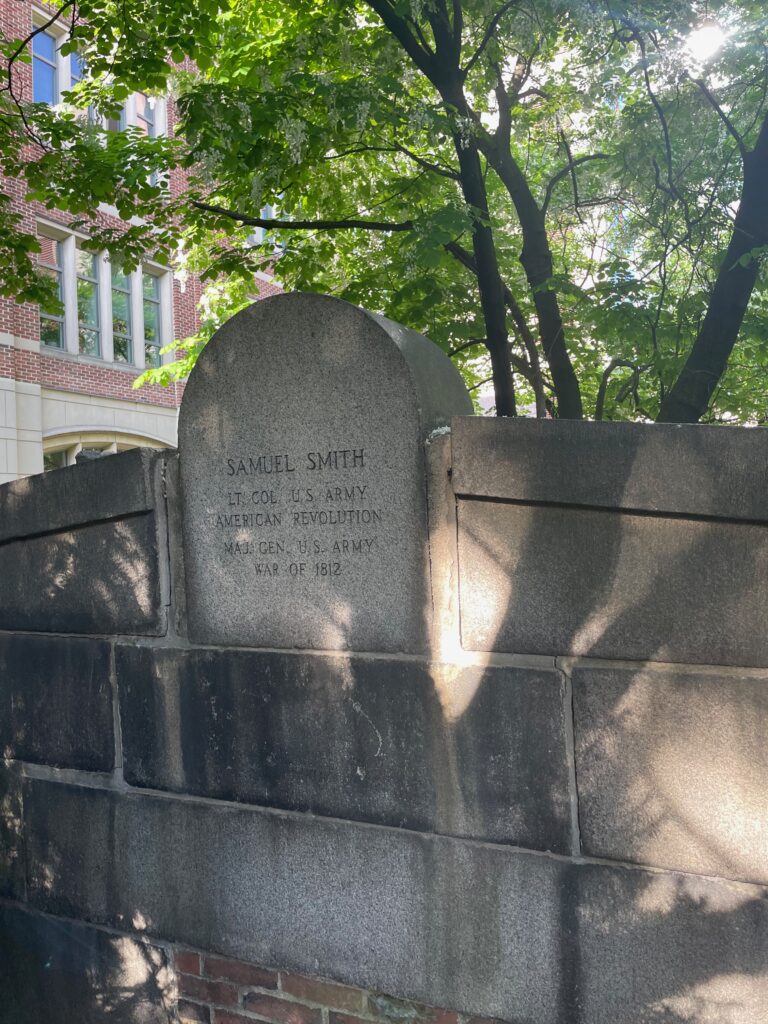Erik Visits an American Grave, Part 1,387
This is the grave of Samuel Smith.

Born in 1752 in Carlisle, Pennsylvania, Smith grew up in the mercantile world of the late colonies, mostly in Baltimore, where his family moved in 1759. His father ended up pretty wealthy. He went into trade himself. He was a young guy doing fairly well for himself, as well as serving in the colonial militia as an officer. Then the American Revolution began. Smith was on the side of the Patriots. He rose pretty quickly in the 4th Maryland Regiment and by 1776, was a lieutenant colonel. His major contribution in the war was that year when he held a fort on the Delaware River long enough to help save Philadelphia. He was also involved in the Battle of Brooklyn, but again, he led troops to delay the British and help others escape. After he led troops in a raid on Staten Island in 1777, which was a disaster, he reamed the general involved harshly, but the guy took it, knowing he screwed up.
After the war, Smith returned to his business interests. He was in the Maryland House of Delegates and was called up during the Whiskey Rebellion to put down the farmers protesting against centralized government and whiskey taxes. This was despite his Jeffersonian politics that meant he was much less hating of the rebellion than, say, Alexander Hamilton. In fact, he had been a Federalist for the first couple of years of that party before switching, as many in the mid-Atlantic states did in these years, which is what made the Jeffersonians the dominant party in a regionally divided America. In 1793, Maryland voters sent him to Congress, where he served five terms. That was a pretty good tenure for that time. He chaired the Committee on Commerce and Manufactures. He also helped broker the deal that ended the election of 1800 with Thomas Jefferson as president after Federalists tried to monkey with it because the total votes were tied between Jefferson and his VP candidate Aaron Burr. Federalists hated Jefferson so much that many wanted to give it to Burr. But Smith, who as a merchant elite could certainly speak to Federalist concerns, helped move a vote to Jefferson and ended it.
In 1803, Smith went from Congress to the Senate, where he remained a solid Jeffersonian vote. He was no exceptional senator, but he did the job. He served two terms and was President Pro Tempore for four years. In 1812, while still serving in the Senate, Smith became a major general in the Maryland militia and was highly involved in defending Baltimore from the British during the 1814 invasion. As a senator, he was mostly just a solid vote, as well as an advocate for a strong military and for trade policies that would help Baltimore merchants.
Smith stepped away from the Senate in 1814, but did not remain out of politics for long. When a vacancy came up in Congress in 1816, Smith was elected to finish the term and he was once again became a reasonably important player in Congress, chairing the Committee on Expenditures and then being an important member of Ways and Means, even if he did not chair it. In 1822, the Jeffersonians sent him back to the Senate, again to fill a vacancy. He would finish that term and then run for another of his own, staying in the Senate until 1833. He was again President Pro Tempore for awhile and he also chaired the Committee on Finance.
In 1833, Smith did not run for reelection. Instead, he became mayor of Baltimore for a three year term in 1835. He was also heavily involved in the idea of sending Black people out of the U.S. and to Liberia and other places for settlement. These ideas were roundly rejected by most, but not all Black Americans. He worked with the Maryland branch of the American Colonization Society to incentive African Americans to move to Liberia. He was a slaver himself, usually owning around 8 slaves. So you can consider him a figure a bit like Henry Clay, someone who owned slaves, realized that it really wasn’t the greatest system in the world for moral reasons, couldn’t possibly imagine allowing large numbers of manumitted slaves loose in America, didn’t believe that the races could live together peacefully, and so wanted them to leave the United States.
Samuel Smith died in Baltimore in 1839. He was 86 years old.
Samuel Smith is buried in Old Westminster Burying Ground, Baltimore, Maryland.
If you would like this series to visit other senators first sent to the Senate during the 1802-03 elections, you can donate to cover the required expenses here. James Hillhouse is in New Haven, Connecticut and Samuel White is in Wilmington, Delaware. Previous posts in this series are archived here and here.


